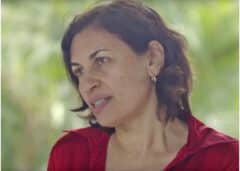The survey is intended for corona patients who suffered from the disease in the last two weeks only. So far 30,000 participants have answered it. Prof. Masha Niv from the Hebrew University, one of the leaders of the international survey, hopes that in the coming period there will be many more Israelis who will answer the survey - like the French, Italians, Spaniards and Americans who did so en masse

In March of this year, reports began to appear about damage to the sense of smell and sometimes also to the sense of taste of corona patients. Recently, anosmia has been added as an official disease symptom in some countries, but many questions are still open and without an unequivocal answer from researchers and doctors around the world - how strong is the damage to the senses? How is it different from flu or other respiratory illness? Is the perception of taste affected directly, or indirectly, due to damage to the sense of smell? How long does it take until the senses return to functioning normally and does damage to these senses indicate a more serious course of the disease, or rather the opposite?
To answer the questions, Prof. Masha Niv from the Hebrew University together with eight other colleagues founded an international association, which goes by the name GCCR, which currently has hundreds of partners in about 40 countries in the world in order to understand the extent of the phenomenon, its causes and effects. The first results of the study were published this week on the pre-peer review server medRXiv which revealed the data of an online survey of 4,000 participants diagnosed with the virus. The study describes the effect of the disease on their senses of taste and smell. About 11.5.2020 thousand respondents have participated in the survey itself so far (May 30, XNUMX), as the data continues to flow and will be analyzed by the researchers participating in the global association in regular intervals. According to Prof. Niv, "The questionnaire in the survey is not intended to give an assessment and lessons regarding the percentage of those who suffer from damage to the sense of taste and smell among all corona patients, but to teach how much the senses of taste and smell are damaged, which tastes are damaged more than others during the disease, and how it is related to a stuffy nose and other symptoms".
The respondents rated their ability to smell, taste, and a burning or tingling sensation (such as hot pepper or menthol candy) on a scale from 0 to 100. The main finding obtained is that, on average, the sense of smell decreased by about 90% and the sense of taste decreased by about 75% relative to what that they felt before they got sick, and a close connection was also found between these two senses. The researcher hypothesizes that the corona virus disrupts the communication between the taste and smell receptors and the brain, whether it is by affecting nerves, the blood vessels around them or communication with the brain. This may be part of the explanation that the decrease is in the sense of smell, taste and burning together. Interestingly, the ability to feel spiciness or burning was reported only by those who felt harm in both taste and smell, and decreased by about 45% on average.

Additional results of the questionnaire state that its participants chose to mark specific tastes that changed during the period of the illness - they often mentioned saltiness, but most of them reported damage to at least two types of tastes (salty, sweet, sour, bitter, and the fifth and least familiar taste to Israelis - umami) . Also, the results clearly indicate that the damage to the senses of taste and smell is not related and does not depend on congestion in the nose. Moreover, a small percentage of the participants also reported phantosmia (sniffing smells that do not exist in reality, such as the smell of smoke when there is no smoke in the air) or parosmia - a common phenomenon during pregnancy (distorted perception of smells, hallucinations of the sense of smell, familiar smells are perceived as different than usual) .
As of today (Monday, 11.5) the questionnaire is available in more than 30 languages - including Hebrew, Arabic and Russian which were added very recently. The Israelis, Prof. Niv points out, are only now starting to answer the questionnaire. "I hope for an increase in the number of Israelis answering the survey. Perhaps unsurprisingly, the French pounced on the questionnaire as soon as it was translated into their language. I assume this is due to the cultural importance that changes in taste and smell have for them, but these senses are significant to all of us. Other languages in which the number of respondents is large are English, Italian and Spanish". The questionnaire is intended for those who suffered from a respiratory illness (any, including corona) in the two weeks before filling out the questionnaire. The questionnaire can be shared in the relevant language.
For research in a pre-publication database
More of the topic in Hayadan:
